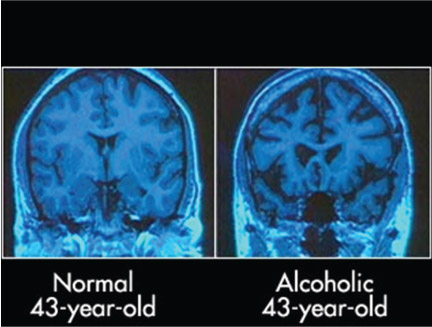2.1.3 Nervous system damage
Chronic consumption of high levels of alcohol can cause irreversible damage to the nervous system. The majority of individuals who consume alcohol excessively have some degree of dementia, which is a general loss of intellectual abilities including memory, judgement and abstract thinking. They may also experience personality changes associated with this condition. Dementia that is specifically related to the chronic consumption of alcohol is known as alcohol-related dementia.
Consider Figure 6 which compares MRI scans of the brain of a normal and an alcoholic individual of the same age. What is the main difference between them?
The MRI scan of the alcoholic brain seems to show shrinking of the brain tissue
The physiological cause of alcohol-related dementia seems to be shrinking of brain tissue, revealed by brain imaging techniques or post-mortem studies, and which is illustrated in the MRI (magnetic resonance imaging) images shown in Figure 6. The extent of shrinkage is associated with the amount of alcohol consumed.
Shrinkage also occurs in several parts of the brain including those areas linked with movement, balance and memory.
However, dementia in people who chronically consume alcohol may also be caused by head injuries, for example, as a result of falling while intoxicated or from being involved in a fight. Therefore, the link between alcohol and dementia is not necessarily a direct one as it can be the result of the social and psychological effects of alcohol consumption.
Alcohol-related dementia can also be linked with vitamin deficiency (B1) as malnutrition is common in individuals who drink excessive amounts of alcohol – alcohol is highly calorific, but it is missing vital nutrients.
Finally, chronic alcohol consumption can also be associated with damage to the peripheral nerves (i.e. those connecting the brain with the rest of the body). This condition is known as alcoholic neuropathy. Peripheral nerve damage can cause signs and symptoms such as sensory disturbances (numbness or pain), motor disturbances (weakness and muscle wasting), and problems with speech, swallowing, heart rate, pupil function, erectile function, and breathing during sleep. The mechanism by which alcohol consumption damages peripheral nerves is not clear and could be associated with a direct toxic effect of ethanol on the nerves, or it could occur indirectly via nutritional deficiencies associated with chronic alcoholism.

